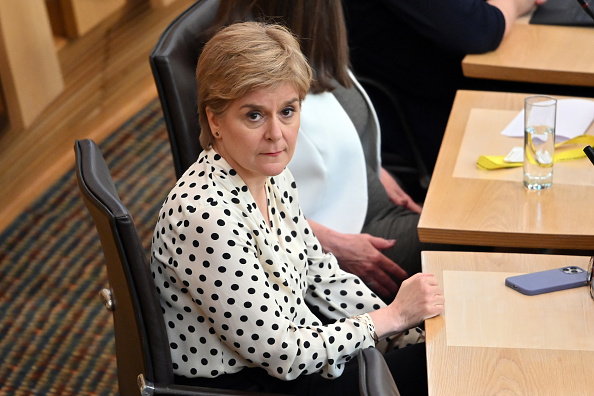We don’t yet know what the eventual outcome of this sorry, shabby, drawn-out saga will be. But the arrest of Nicola Sturgeon today (11 June), which followed the April arrest of her husband Peter Murrell – until recently the all-powerful chief executive of the SNP – inevitably casts a long shadow over the nation and the party that the couple dominated for so many years.
Sturgeon’s arrest and subsequent questioning by police involved in Operation Branchform, an investigation into how £600,000 of funding raised by the SNP for independence campaigning was spent, was widely expected (she has been released without charge pending further investigation). That is not to reduce its drama.
On 5 April, officers swooped on the home shared by Sturgeon and Murrell in Glasgow, erecting a large blue tent in the front garden while they removed boxes of documents from the house. At the same time, police arrived at SNP HQ in Edinburgh and carted off many more files. Police later seized a £100,000 motorhome from the driveway of Murrell’s mother’s house in Dunfermline.

When Sturgeon announced her surprise resignation as first minister on 15 February, she gave several reasons, including the “brutality” of life as a politician and a realisation she could no longer give the job all it needed. She denied that her decision was influenced by the ongoing police investigation into SNP finances.
Inevitably, given all that has happened since, voters will be wondering whether that was strictly true. Following her departure, a video emerged from March 2021 – shortly before Operation Branchform began – in which she warned a meeting of her party’s National Executive Committee to keep quiet about any concerns they might have about the state of SNP accounts. She told them: “I’ve been on this body continuously for 20 years or so. I’ve been on this body when the party has frankly been teetering on the edge of bankruptcy. The party has never been in a stronger financial position than it is right now and that’s a reflection of our strength and our membership.”
The police investigation has made normal political life in Scotland impossible, and it has blighted the first months in office of Sturgeon’s successor, Humza Yousaf. In recent weeks, the SNP has been forced to find new auditors, choosing a Manchester-based company, AMS Accountants Group, after its long-time Scottish auditors, Johnston Carmichael, said it was no longer willing to work with the party.
The drumbeat of arrests and revelations has overwhelmed Yousaf’s efforts to establish himself in office, which have largely revolved around unpicking the unpopular or unworkable policies left behind by his friend and mentor. Earlier today, the new First Minister appeared on Laura Kuenssberg’s BBC show and announced that Sturgeon was “in a good place and doing well”. Sturgeon was in a police station interview room just a few hours later.
The fact is every former SNP first minister has been arrested after leaving office. Alex Salmond, who resigned in 2014 to make way for Sturgeon, was later cleared in court over allegations of sexual misconduct while in office.
The electorate seems finally to be turning against Scotland’s governing party, hegemonic for so long, and party donations have collapsed. Meanwhile, Scottish Labour continues to recover in the polls. There is no prospect of an independence referendum in the short term, and probably not in the medium term. The SNP seems likely to lose seats at the next general election, and perhaps even its pro-independence majority at the 2026 Holyrood election.
The SNP’s struggles are a parable of what can go wrong in politics. Not so long ago, Nicola Sturgeon swept all before her and promised the imminent break-up of the United Kingdom – or at the very least a second independence referendum. Now she has been arrested.
[See also: Will the SNP be swept away by Scottish Labour?]






